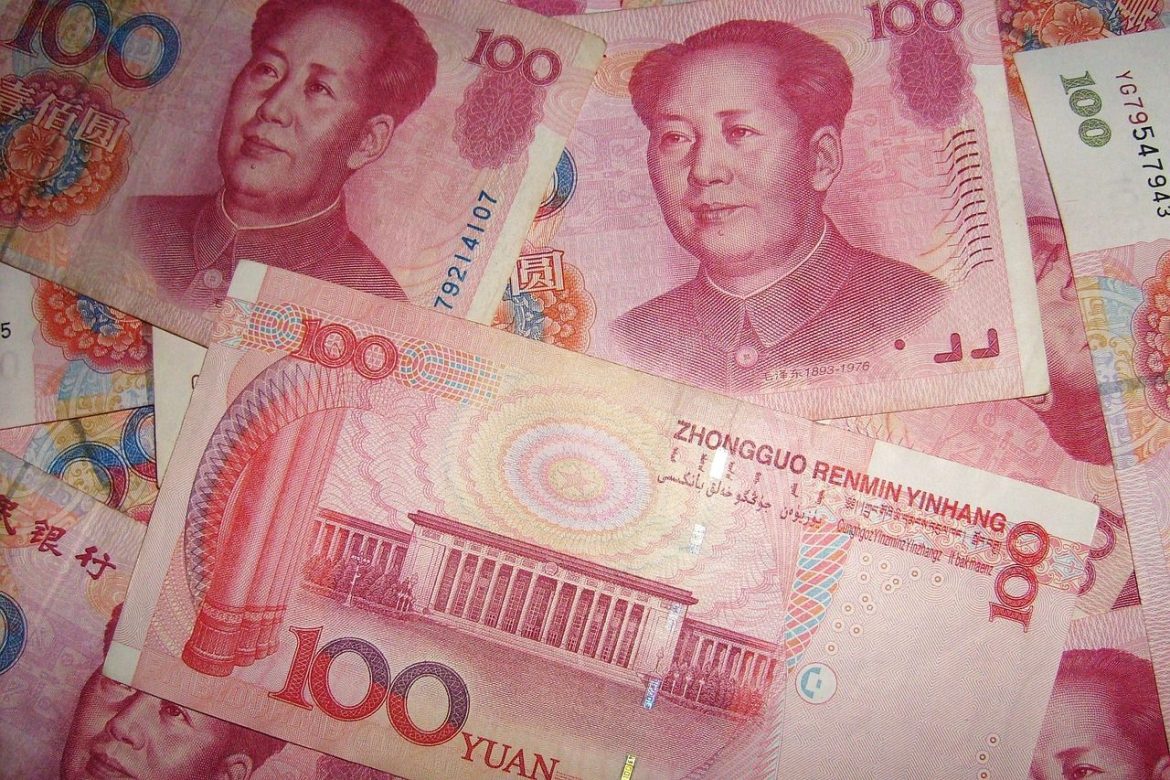China loosened its grip on the yuan by setting the daily reference rate past the closely watched 7.20 per dollar mark, as the escalating trade war with the United States forces Beijing into difficult policy decisions.
The yuan, which is tightly controlled by the People’s Bank of China, dropped to 7.3363 to the dollar, the weakest level since September 2023 after the PBOC lowered its target rate for the yuan to 7.2038/dollar (it can then move up or down by 2%).
It marks the first time the fixing breached 7.20 since President Donald Trump’s election victory last November, a threshold that had been viewed by investors as an unofficial red line signalling China’s tolerance for a weaker currency.
The move prompted an immediate sell-off in the spot yuan, before recovering some ground.
While broader market sentiment showed some improvement, the weaker fixing unsettled currency traders already nervous about the deepening US-China standoff.
Stephen Innes, managing partner at SPI Asset Management, says the yuan has slipped past the ‘line in the sand’.
“This isn’t a warning shot, it’s Beijing quietly signalling that something much bigger could be coming. We flagged this yesterday, even as certain anti-Trump media corners tried to spin a weaker yuan as some kind of export booster. Let’s be honest: devaluation isn’t stimulus — it’s desperation. And it comes with serious tail risk,” he warned.
Currency strategy caught between trade support and capital flight fears
The timing of the adjustment reflects growing urgency in Beijing to support its faltering export sector, now under heightened strain from Washington’s aggressive tariff hikes.
A weaker yuan would make Chinese goods more competitive overseas, potentially offsetting some of the damage from American duties.
However, the decision to loosen currency controls is fraught with risks.
A rapid depreciation could stoke capital outflows, unsettle financial markets, and further antagonise Washington at a time when the prospects for any trade negotiations have dimmed sharply.
Source: Forexlive
“China devalued the yuan back in 2015 to respond to an economic slowdown and boost exports. That move surprised the markets and sent them into risk-off mode as people feared China’s economy was worse than expected,” said Giuseppe Dellamotta, macro and technical analyst at Forexlive.
“The US stock market reacted by falling more than 10% back then.”
Dellamotta said if China pursues the strategy of yuan devaluation, it could lead to an escalation in the trade war as Trump won’t be happy as he’s dubbed China a “currency manipulator” for a long time.
“The markets will likely expect something worse in response and the fear and uncertainty will likely weigh on the stock market further,” he said.
Keeping the exchange rate artificially strong also carries downsides, potentially curbing exports and risking a sharper correction later if pent-up depreciation pressures are unleashed all at once.
Becky Liu, head of China macro strategy at Standard Chartered Bank, noted: “The fixing could mean China’s foreign-exchange regime is now changed to managed depreciation rather than a firm cap under 7.35 for the spot yuan.”
Escalating tariffs raise pressure on Beijing
On Monday, President Trump threatened to impose an additional 50% tariff on Chinese imports if Beijing does not step back from its retaliatory plans.
In response, China’s Ministry of Commerce vowed to “fight to the end,” while announcing countermeasures including tariffs on all US goods and export controls on critical rare earth minerals.
Traders had been anticipating a potential recalibration of China’s currency strategy since the start of Trump’s second term, but policymakers had consistently pledged to maintain yuan stability and avoid excessive swings in the exchange rate.
Now, in the wake of tariff hikes that jolted global markets, investors are watching closely for fresh signals from the central bank on its stance toward the yuan — and whether Beijing is poised to restart monetary easing.
“The developments from the past week illustrate very clearly why we have argued for the past half year that intentional yuan depreciation to offset tariffs was a heavily flawed argument,” said Lynn Song, chief economist for Greater China at ING Think.
She added that a large devaluation would harm domestic purchasing power and market confidence, outweighing any gains in trade competitiveness.
Analysts see room for gradual yuan flexibility
A growing cohort of analysts sees room for the yuan to fall further, though most expect the PBOC to proceed cautiously.
Wells Fargo & Co. sees risks of up to a 15% deliberate depreciation over a two-month period.
“There’s a 75% chance Beijing will devalue the yuan and should the PBOC decide to do so, it’s likely to “go big, like 20 or 30%,” said Brad Bechtel, global head of FX at Jefferies Financial Group Inc.
However, most expect any move to be more measured, as a sharp devaluation could accelerate capital outflows and further erode investor confidence in Chinese assets.
Even if bearish sentiment gathers momentum, the PBOC has a broad toolkit to manage market volatility.
In the past, it has used measures like tweaking foreign-exchange liquidity and issuing offshore bills to curb the yuan’s decline.
“We reckon that the PBOC will allow more two-way FX flexibility gradually to adjust the choppy market after the tariff day, but a sharp yuan depreciation is unlikely due to capital outflow risks,” said Ken Cheung, chief Asia FX strategist at Mizuho Bank Ltd.
The PBOC will also opt to preserve FX stability to gain room to resume monetary easing.
The post The yuan’s descent: risks amid trade tensions and how far will China let it fall? appeared first on Invezz

